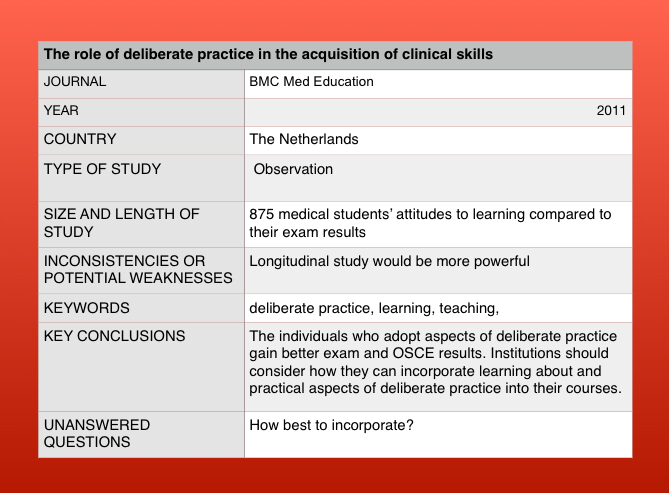|
A very interesting study which backs up a lot of the ideas presented in BOUNCE and BLACK BOX THINKING about how to master any task using deliberate practice, learning from failure and feedback. Research in other domains, mostly by Ericsson and colleagues, has shown that the main determinant of success in expert performers is not the amount of time spent practising, but the amount of time devoted to activities specifically targeted at aspects of performance that need improvement. After initial mastery of basic skills, some types of practice, the proficient execution of routine tasks for example, are unlikely to lead to further improvement. In other words, repetition in itself is not enough. This highly targeted type of learning has been given the term DELIBERATE PRACTICE. The tentative conclusion seems justified that educators can facilitate clinical skill development by equipping students with skills to use (aspects of) deliberate practice. Thus the teaching of clinical skills should incorporate the use of efficient strategies to practise them.
A key challenge for students is to acquire appropriate study habits to support their continuing improvement. This type of learning is only possible with students' full cooperation. In other words, it requires students' active participation in their learning. Students need to adopt attitudes and strategies that are conducive to the planning of their learning and evaluation of their current and desired skill performance so as to enhance their habits of skill practice. This implies that course designers should accommodate this process by aiming for a learning environment that incorporates these characteristics. However, for students to become lifelong learners, they need to develop self-assessment skills along the way during their training. The literature on self-assessment has pointed out that medical students, residents and physicians have limited ability to accurately judge their own performance. We should teach students to use this approach from an early phase in their education to maximise its beneficial effects. https://www.ncbi.nlm.nih.gov/pmc/articles/PMC3293754/
1 Comment
|
AuthorDr Chris Harper Archives
August 2020
Categories
All
|



 RSS Feed
RSS Feed
